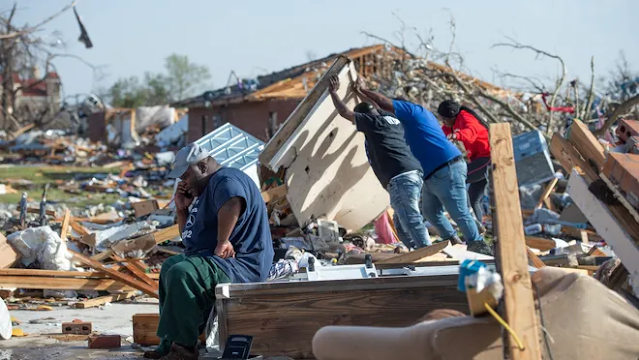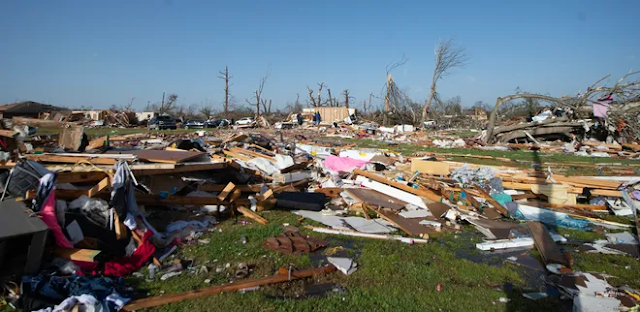'My city is gone': At least 23 dead after tornadoes rip through Mississippi, emergency officials report
Tornadoes left a trail of destruction across rural Mississippi overnight Friday, killing at least 23 people, razing buildings and plunging thousands of homes into darkness.
In addition to the dead, dozens of people were injured and four were missing in the wake of a spate of tornadoes, the Mississippi Emergency Management Agency confirmed Saturday morning. Search and rescue efforts stretched into the morning as crews also began damage assessments Saturday, the agency said. The death toll may continue to climb, according to the agency.
Much of the worst impacts spawned from a storm that carved a devastating path northeastward across Mississippi and Alabama, according to AccuWeather. The rural towns of Silver City and Rolling Fork, about 60 miles northeast of Jackson, Mississippi, bore the brunt of damage from a tornado
"Houses [were] completely demolished, businesses demolished … pretty much most of the town is unrecognizable right now," Baeley Williams, one of the first responders in Rolling Fork, told AccuWeather.
Search and rescue efforts underway Saturday
Significant amounts of debris are blocking roads, the Mississippi Department of Transportation said, adding that some of it seemed to have traveled over 100 miles in the storm. Patients from Rolling Fork's Sharkey-Issaquena Community Hospital were transferred to other hospitals after the building was damaged by the storm, according to the Mississippi Emergency Management Agency.
Mississippi Gov. Tate Reeves said in Twitter posts on Friday and Saturday that search and rescue efforts were continuing and authorities were surging more ambulances and other emergency assets to the area. He also said he had finished a briefing with disaster response teams and was headed to Sharkey County.
"The loss will be felt in these towns forever," he said. "Please pray for God’s hand to be over all who lost family and friends."
Witnesses describe devastation in Mississippi town Rolling Fork
Victoria Garland of Onward was in Rolling Fork with her husband early Saturday, trying to help residents grappling with the damage. She called it "total devastation."
"A lot we could see was gone," she said. "The skyline you grew up with your whole life is gone. The businesses we rely on are gone. We're definitely in shock."
Garland said a Rolling Fork animal shelter was destroyed, but three dogs miraculously survived.
"I don't know how," she said. "To find a live dog was unbelievable. It's just unreal."
Rolling Fork mayor Eldridge Walker told WLBT-TV he was unable to get out of his damaged home soon after the tornado hit because power lines were down. He told CNN his town had largely been wiped out.
"My city is gone," he said. "But we are resilient and we are going to come back strong."
Saturday morning, over 15,500 households were without power in Mississippi, along with 20,400 in Alabama and 53,700 in Tennessee, according to poweroutage.us.
Tornado reports in Mississippi, Alabama
There were at least two dozen tornado reports Friday across Mississippi and Alabama, including in Mississippi's Rolling Fork, Silver City and Winona, according to the National Weather Service Storm Prediction Center.
In Alabama's Morgan County, first responders are going door-to-door to check on residents. Crews rescued a man who was stuck in the mud when a trailer was overturned and six people trapped in a home, according to the county sheriff's office.
Central Mississippi is expected to get more rain on Sunday, with thunderstorms possible in the afternoon, according to AccuWeather. Severe thunderstorms may continue with possible large hail, damaging gusts and more tornadoes from far east Texas and central Louisiana into southern and central Mississippi, Alabama and Georgia on Sunday, according to the National Weather Service.
National Weather Service warns of dangers after storms
As search and rescue teams work at the scene of tornado damage, the National Weather Service urged residents of affected areas to be wary of dangers that may remain even after the storms pass. Here are some tips:
- Use generators outdoors and at least 20 feet away from doors, windows and garages to avoid carbon monoxide poisoning.
- Drink bottled or boiled water only and be aware of food spoiling in fridges.
- Do not enter damaged buildings until authorities say it's safe.
- Leave your home if there's shifting or unusual noises.
- If you smell gas, get outdoors immediately and call 911.
- Stay far from power lines.
- Do not walk or drive through floodwaters.
Previously, weather service forecasters on Friday night warned the tornadoes would cause a "life-threatening situation." As the storm hit, the agency issued an alert in the area, saying "To protect your life, TAKE COVER NOW!"
Nighttime tornadoes are deadly
Nighttime tornadoes are twice as likely to be deadly as daytime tornadoes, scientists report. A 2008 study published by Northern Illinois University professors Walker Ashley and Andrew Krmenec found that nighttime tornadoes made up only 27% of all tornadoes from 1950 to 2005, but were responsible for 39% of all tornado deaths.
In fact, one in 32 nighttime tornadoes results in a death compared with one in 64 in the daytime.
Some reasons for this are obvious, according to Weather.com meteorologist Jon Erdman.
Unless lit by at least somewhat frequent lightning, you may not see a tornado at night, Erdman said. "One challenge the meteorological and social science communities face is getting the public to take shelter immediately, without first 'confirming the threat' of a tornado by looking outside and wasting precious seconds to reach shelter."
He added that most people are at home and asleep at night and can be unaware of an approaching tornado threat: If you can’t see a tornado coming, it is more likely to kill you, and even more so if you have already gone to bed.



